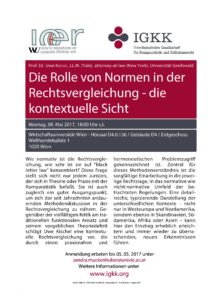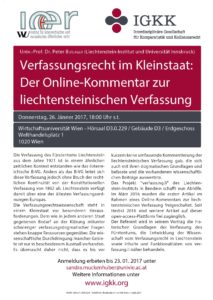Veranstaltungen

Veranstaltungen Search and Views Navigation
Mai 2017
Januar 2017
Oktober 2016
Internationale Bankgeschäfte mit Verbrauchern
Vorträge: Gerichtsstandsklauseln in Bankverträgen - Prof. Dr. Peter Mankowski Rechtswahlklauseln in Bankverträgen - RA Hon.-Prof. Dr. Mag. Dietmar Czernich, LL.M. Internationale Zuständigkeit und anwendbares Recht bei arbeitsteiligem Vertrieb von Finanzprodukten - Hofrat des OGH Univ.-Prof. Dr. Georg Kodek, LL.M. Anwendbares Recht bei grenzüberschreitender Prospekthaftung – Privatdozentin Dr. Judith Schacherreiter Internationaler Anlegerschutz bei Crowdfunding - Prof. Dr. Gerald Spindler Internationale Zuständigkeit und anwendbares Recht bei Vertrieb von Finanzdienstleistungen im Fernabsatz - MMag. Dr. Florian Heindler Anmeldung erbeten bis 17. Oktober 2016 Sekretariat der Interdisziplinären Gesellschaft für Komparatistik und Kollisionsrecht Tel. (+43) 01 4277 - 35102 oder unter sandra.muckenhuber@univie.ac.at
Erfahren Sie mehr »April 2016
Men giving birth, children with three parents, and other future family law problems
Family law for a long time was only centred on one particular family unit: a man and a woman united in (indissoluble) marriage, and with children. But we now live in a world where marriages often end in divorce; where categories of gender are not as fixed as they used to be and legal men can give birth to children; where children are not necessarily genetically related to their birthparents or indeed may have three genetic parents, and even more social parents. The law has been too slow to react to societal changes and medical advances, and these issues need to be dealt with as a matter of urgency.
Erfahren Sie mehr »Dezember 2015
Prof. HUO – The Latest Development of Chinese Private International Law
The past decade has witnessed an amazing acceleration in the development of private international law legislation in China as well as a signicant progress in the quality thereof. In 2010, the Standing Committee of the National People’s Congress adopted China’s rst statute on private international law (Private International Law Act). The adoption of the Act is a historic event in Chinese legislative history, as it indicates that China has modernised its conflict of law rules after many years of unremitting eorts made by legislators and scholars. Moreover, the Supreme People’s Court of the PRC promulgated an Interpretation (I) of the Private International Law Act in 2013. The Interpretation (I) attempts to provide concrete explanations on the abstract articles mainly in Chapter…
Erfahren Sie mehr »November 2015
Prof. ROTOLO and Prof. SCHICHL – Law and Logic – Current research trends, applications and perspectives from a legal philosopher’s and a mathematician’s view
In a first part, research trends in legal logic from the viewpoint of legal philosophy and artificial intelligence and law will be outlined. In particular, the following perspectives and challenges will be considered: (a) developing innovative logics and argumentation frameworks for modelling and representing legal interpretation and interpretive canons; (b) devising adequate and comprehensive logical models for understanding and reconstructing norm change mechanisms and legal dynamics; (c) studying the game-theoretic nature of argumentation in the law and identifying what game types can be used in general to model strategic legal dialogues; (d) combining deontic logics with other systems – e.g., action logics, epistemic logics, preference logics – to grasp legal concepts such as trust, responsibility, and influence. In a second…
Erfahren Sie mehr »Oktober 2015
Prof. MATHIS – Hilft die Regulierung durch „Nudges“ den Menschen, bessere Entscheidungen zu treffen, oder gefährdet sie ihre Autonomie?
Die neoklassische Theorie basiert auf dem Modell des homo oeconomicus, der eigennützig und rational handelt. Hinzu kommt die stillschweigende Annahme der unbegrenzten Wil-lenskraft, d.h. dass einmal gefällte Entscheidungen auch in die Tat umgesetzt werden. Zahl-reiche empirische Studien haben gezeigt, dass die Annahmen der neoklassischen Theorie in der Realität oft nicht zutreffen. Durch die Verhaltensökonomie wird in erster Linie die Ratio-nalitätsannahme hinterfragt. Daniel Kahneman unterscheidet zwei Denksysteme: einen schnellen, intuitiven Denkmodus (System 1) und einen langsamen, rationalen Denkmodus (System 2). Denkmodus 1 bedient sich kognitiver Faustregeln („heuristics“), die zu kognitiven Verzerrungen („biases“) führen können. Um die Entscheidungen der Individuen zu verbes-sern, schlagen Richard Thaler und Cass R. Sunstein vor, die Entscheidungsarchitektur („choice architecture“) der Individuen so zu gestalten, dass diese in…
Erfahren Sie mehr »Juni 2015
Prof. Olga KHAZOVA – The Concept of the Best Interests of the Child and New Forms of Families
The main focus of the lecture will be the concept of the best interests of the child, stipulated in the UN Convention on the Rights of the Child. This concept is considered to be one of the most important and difficult to be applied in practice. In family-related situations, there are many factors that need to be taken into account when assessing what is in the best interests of a particular child. This task with regard to what is called ‘new forms of families’ or ‘alternative families’ is even much more difficult. At the same time this is increasingly becoming an evolving issue in Europe. Apart from that, it is often linked to another complicated and challenging topic – the…
Erfahren Sie mehr »„Religionsfreiheit und Kinderrechte“
Die Auseinandersetzung um die rituelle, medizinisch nicht indizierte Genitalbeschneidung unmündiger Jungen findet seit dem Urteil des Kölner Landgerichts vom Mai 2012 in ganz Europa statt. Viele Disziplinen sind von dieser Auseinandersetzung betroffen: Die Ethnologie, die Medizin, die Soziologie, die Geschichte, aber natürlich auch die Rechtswissenschaften. Die Diskutanten gehen dieser Thematik im Hinblick auf die Kinderrechte, insbesondere das Recht auf körperliche Unversehrtheit, das elterliche Erziehungsrecht sowie das Grundrecht auf Religionsfreiheit nach.
Erfahren Sie mehr »Mai 2015
Prof. Philippe LORTIE – Direct judicial communications under the 1980 Hague Child Abduction Convention and the International Hague Network of Judges
The principal aim of the International Hague Network of Judges (IHNJ) is to improve the operation of the Hague Child Abduction Convention and the handling of other cross-border civil cases relating to children by promoting international judicial co-operation. By creating direct contact points between members of the judiciary in different States, speedier and more satisfactory resolutions of cross-border disputes involving children, and in particular child abduction cases, will be achieved. The IHNJ also allows for the exchange of information between judges to increase knowledge and improve practice under the 1980 Convention and under other Hague Children’s Conventions, as appropriate. Further to presenting the IHNJ, the Emerging Guidance regarding the development of the IHNJ and the General Principles for Judicial Communications,…
Erfahren Sie mehr »

